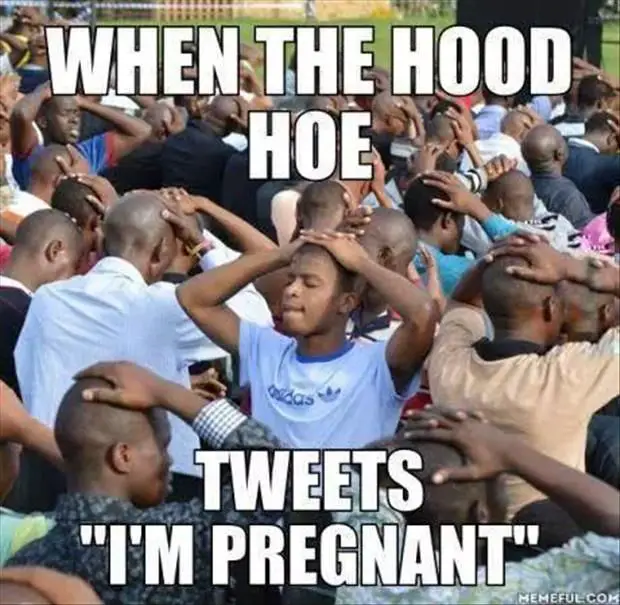In the digital realm where humor often intertwines with social commentary, a meme circulates that offers a satirical glimpse into communal reactions to personal announcements. The meme, emblazoned with the text “WHEN THE HOOD HOE TWEETS ‘I’M PREGNANT’,” features a photo capturing a crowd of individuals with their hands on their heads, portraying gestures of shock and disbelief.
The central figure is a young boy, his eyes closed and his hand pressed against his forehead, standing as the focal point among the sea of astonished faces. This orchestrated chaos, whether a snapshot from an event or a staged portrayal, is emblematic of a collective experience of surprise, one that the meme amplifies through its caption.
The meme’s creator employs humor to tackle the themes of reputation and unexpected news within a community, employing the term “hood” to refer to a neighborhood and “hoe” as a slang term for someone perceived to have many sexual partners. This blunt and colloquial language reflects the vernacular often used on social media platforms, where brevity and impact are prized.
While the image is crafted to entertain, it also subtly delves into the complex dynamics of community perception, gossip, and the viral nature of personal news on social platforms like Twitter. The announcement of a pregnancy, particularly when coming from an individual who may be the subject of local gossip, acts as a catalyst for a wave of reactions—real or imagined.
This meme is a part of the broader internet culture that combines text with evocative images to create a narrative that resonates with or amuses the audience. It exploits the immediacy of social media, where news spreads swiftly and public reactions are often exaggerated for comedic or dramatic effect.
As with many pieces of viral content, the underlying message is layered. On the surface, it elicits laughter or a knowing nod, but it also invites reflection on how we perceive and spread personal news within our own circles. It’s a modern-day parable of the speed and sometimes judgmental nature of communication in the age of social media, reminding us of the power of words and images to shape narratives and incite reactions.
Despite its humorous intent, it’s crucial to approach such content with sensitivity, recognizing that humor can sometimes intersect with individuals’ personal lives and societal judgments. In a world where memes can become the message, a critical eye towards empathy and understanding remains essential.
